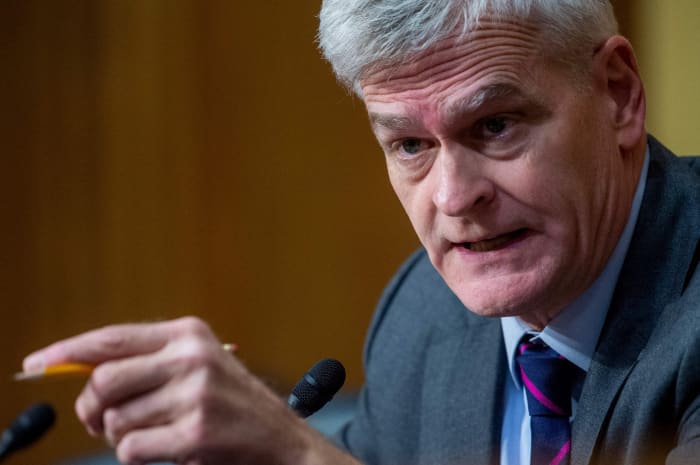A government watchdog will probe the Biden administration’s approach to rolling out a new version of the Free Application for Federal Student Aid (FAFSA), Republican lawmakers announced as they slammed the Department of Education over delays in releasing the crucial form.
The Government Accountability Office has taken up Republican lawmakers’ requests to look into questions regarding the launch of the new FAFSA form, Sen. Bill Cassidy, a Louisiana Republican, told reporters Thursday. The announcement comes days after the Education Department said it would be sending colleges the data they need to make financial-aid decisions several weeks later than initially promised.
Cassidy and other lawmakers tied the Department’s challenges implementing the new form to the Biden administration’s student-loan forgiveness efforts, accusing officials of focusing too intently on those initiatives at the expense of other tasks.
“In the last three years, the Biden administration’s Department of Education has put considerable time and resources [into prioritizing] their student loan schemes, but they’ve been unable to fulfill their basic responsibilities mandated by Congress,” said Cassidy, the ranking member of the Senate committee that oversees education. “President Biden, Secretary Cardona, you need to explain why the American people are having to live with the consequences of this administration’s upside-down priorities.”
Congress mandated a major FAFSA overhaul
A series of laws passed by Congress mandated that the Department overhaul the FAFSA and implement the changes by the end of last year. The form is crucial for students, families and colleges in determining the cost of schooling. Students need to fill out the form to get access to federal student aid and grants. Colleges, states and other institutions use the data provided by the form to figure out how much of their own money to award to students.
The changes were meant to make the form simpler to fill out and to direct more money to low-income students. But its initial rollout has been plagued with challenges. In the first several days of the form’s launch students and families faced challenges actually filling it out. The Department also initially failed to implement a change that would account for inflation when determining students’ aid eligibility.
Now, the Department is making the change, which the agency estimates will result in an extra $1.8 billion for students, but is a contributor to the delay in transmitting the FAFSA data to schools. College counselors, higher education institutions, advocacy groups and others have said the delays will squeeze the amount of time colleges and students have to make decisions significantly.
They’ve also said that the glitches could wind up hurting the students the form is supposed to help the most. Low-income students who rely on the aid to attend college will be in limbo for months as they wait to learn what they’re eligible for. The uncertainty and glitches could deter these students from enrolling, advocates have said.
As a result of the delays, a coalition of financial-aid and college-access organizations are urging schools to extend their decision deadline past May 1 — the date when, in a typical cycle, students are asked to commit to a school.
A Department of Education spokesperson said in a statement that the agency has “been working tirelessly” on the FAFSA overhaul since the fall of 2022. The spokesperson also noted that the undertaking involves implementing “the most significant changes to the financial aid system in over 40 years.”
The Department has “repeatedly” asked for additional funding for the Office of Federal Student Aid “to no avail with Congressional Republicans,” the spokesperson said.
“Meanwhile, despite their criticism and opposition, we are making college more accessible and we continue the important work of making it simpler and easier for families to get help paying for college,” the statement reads. “We welcome support from all those who will help us achieve that goal.”
Earlier this week, a senior Department official told reporters that Congress is requiring FSA to complete three labor and resource-intensive tasks at the same time without additional funding. In addition to rolling out the new FAFSA, in the past several months the agency has been tasked with returning 28 million borrowers to student loan repayment after a more than three-year pause and implementing a new student loan servicing system.
Congressional Republicans said the Department’s funding challenges were a result of a too-intense focus on student loan forgiveness.
“They’ve got mud on their face and they’re trying to make excuses that they didn’t have resources, they didn’t have time,” Sen. Shelley Capito, a West Virginia Republican.
“Fix this now,” she added.







